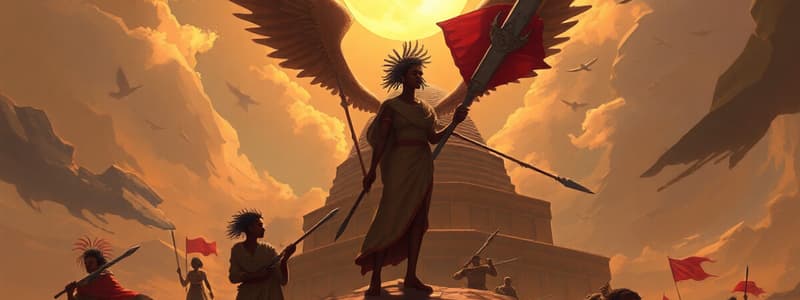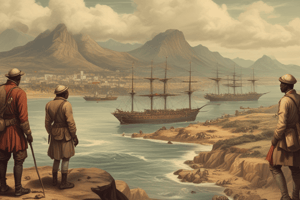Podcast
Questions and Answers
What are the primary motivations for European imperialism during the late 1800s?
What are the primary motivations for European imperialism during the late 1800s?
The primary motivations for European imperialism during the late 1800s were the search for low-cost raw materials, the need for new places for Europe's growing population, and the desire to spread Western culture and religion.
What were the three main types of territories established by European powers during the era of imperialism?
What were the three main types of territories established by European powers during the era of imperialism?
- Colonies, Protectorates, and Trade Agreements
- Colonies, Protectorates, and Independent Nations
- Colonies, Protectorates, and Spheres of Influence (correct)
- Colonies, Protectorates, and Military Bases
Why did European powers use nationalism and social Darwinism to justify their imperial actions?
Why did European powers use nationalism and social Darwinism to justify their imperial actions?
European powers used nationalism and social Darwinism to justify their imperial actions because they believed that Western culture and civilization were inherently superior to the cultures and civilizations of the colonized peoples.
What were the significant effects of the Industrial Revolution on European imperialism?
What were the significant effects of the Industrial Revolution on European imperialism?
The Berlin Conference of 1884 was attended by African representatives who had a say in the division of their land.
The Berlin Conference of 1884 was attended by African representatives who had a say in the division of their land.
What was the key outcome of the Berlin Conference of 1884?
What was the key outcome of the Berlin Conference of 1884?
How did the colonization of the Middle East by Europeans lead to conflict?
How did the colonization of the Middle East by Europeans lead to conflict?
The Sepoy Rebellion of 1857 was a successful uprising against British rule in India.
The Sepoy Rebellion of 1857 was a successful uprising against British rule in India.
What was the British East India Company's role in fueling tensions with China?
What was the British East India Company's role in fueling tensions with China?
What were the factors that contributed to European colonization of the Pacific Islands?
What were the factors that contributed to European colonization of the Pacific Islands?
How did European colonization impact the relationship between Western nations and their colonies?
How did European colonization impact the relationship between Western nations and their colonies?
What were the effects of the Monroe Doctrine on U.S. imperialism in Latin America?
What were the effects of the Monroe Doctrine on U.S. imperialism in Latin America?
The Spanish-American War was a direct result of U.S. efforts to expand its colonial holdings in Latin America.
The Spanish-American War was a direct result of U.S. efforts to expand its colonial holdings in Latin America.
What was the key consequence of the Roosevelt Corollary?
What was the key consequence of the Roosevelt Corollary?
The construction of the Panama Canal had a negative impact on Latin American economies and its role in global trade.
The construction of the Panama Canal had a negative impact on Latin American economies and its role in global trade.
How did imperialism differ in Latin America compared to other regions during the same period?
How did imperialism differ in Latin America compared to other regions during the same period?
Flashcards
Imperialism
Imperialism
A policy of extending a country's power and influence through diplomacy or military force.
Modernization
Modernization
The process of updating a society's technology, infrastructure, and social structures to become more modern and advanced.
Raw materials
Raw materials
Natural resources that are used to produce finished goods.
Colonies
Colonies
Signup and view all the flashcards
Protectorates
Protectorates
Signup and view all the flashcards
Spheres of influence
Spheres of influence
Signup and view all the flashcards
Direct rule
Direct rule
Signup and view all the flashcards
Indirect rule
Indirect rule
Signup and view all the flashcards
Nationalism
Nationalism
Signup and view all the flashcards
Social Darwinism
Social Darwinism
Signup and view all the flashcards
Missionaries
Missionaries
Signup and view all the flashcards
Industrial Revolution
Industrial Revolution
Signup and view all the flashcards
Berlin Conference (1884)
Berlin Conference (1884)
Signup and view all the flashcards
Free trade
Free trade
Signup and view all the flashcards
Sepoy Rebellion (1857)
Sepoy Rebellion (1857)
Signup and view all the flashcards
Opium Wars
Opium Wars
Signup and view all the flashcards
Boxer Rebellion
Boxer Rebellion
Signup and view all the flashcards
Monroe Doctrine
Monroe Doctrine
Signup and view all the flashcards
Roosevelt Corollary
Roosevelt Corollary
Signup and view all the flashcards
Panama Canal
Panama Canal
Signup and view all the flashcards
Treaty of Paris (1898)
Treaty of Paris (1898)
Signup and view all the flashcards
Latin American Imperialism
Latin American Imperialism
Signup and view all the flashcards
How did imperialism impact Africa?
How did imperialism impact Africa?
Signup and view all the flashcards
How did European powers conquer India?
How did European powers conquer India?
Signup and view all the flashcards
What led to Chinese resistance to European powers?
What led to Chinese resistance to European powers?
Signup and view all the flashcards
What was the impact of European imperialism on the Pacific Islands?
What was the impact of European imperialism on the Pacific Islands?
Signup and view all the flashcards
What was the impact of imperialism on Latin America?
What was the impact of imperialism on Latin America?
Signup and view all the flashcards
What was the significance of the Panama Canal?
What was the significance of the Panama Canal?
Signup and view all the flashcards
Study Notes
European Expansion
- Imperialism modernized many parts of the world and established Western powers.
- European powers sought low-cost raw materials, leading to colonization of resource-rich territories.
- Colonization provided new homes for the growing European population.
- Colonies were categorized as colonies, protectorates, or spheres of influence.
- Direct rule (e.g., France) and indirect rule (e.g., Britain) were used to control colonies.
- Nationalism and Social Darwinism were used to justify imperialism.
- Missionaries spread Western religion and culture in colonies.
- Industrial Revolution's demand for raw materials fueled international relations.
- Western nations gained power through military force and trade agreements in Africa, India, China, Southeast Asia, and Latin America.
Imperialism in Africa and the Middle East
- Africa's resources (gold, diamonds, platinum) attracted European powers.
- The Berlin Conference (1884) divided African territory among European powers without African input.
- African resistance to imperialism.
- Ethiopia and Liberia retained independence.
- European expansion in the Middle East benefited from the decline of the Ottoman Empire.
- The Suez Canal and other infrastructure were developed.
- Christian-Muslim clashes arose due to colonization.
- Colonization responses often resulted in violence.
Imperialism in India, China, and the Pacific Islands
- Britain's relationship with India shifted to conquest and colonization.
- British reforms clashed with Hindu traditions and fueled resentment.
- The Sepoy Rebellion (1857) led to British control of India.
- Exposure to industrial technologies increased wealth and education in India, but resentment also grew.
- Britain's opium trade with China caused conflict.
- Opium Wars led to treaties granting trading rights to Britain and other European powers.
- Boxer Rebellion resisted European influence.
- Pacific Islands were colonized for their strategic location and resources.
Imperialism in Latin America
- The Monroe Doctrine set a stage for US imperialism, though Latin America had political independence.
- Dependence on the developed world hampered their economy and politics.
- Latin American countries exported raw goods, imported finished goods, and received external investment.
- The Monroe Doctrine aimed to prevent European expansion in Latin America but its enforcement occurred later.
- The Spanish-American War prompted US control over territories like the Philippines.
- The Roosevelt Corollary established US international police power in the region.
- The Panama Canal project positioned the US as a global power.
- Latin American imperialism differed from earlier imperialism in the East because colonial countries in Latin America were independent but were still under the influence of Western powers through political and economic doctrines.
Studying That Suits You
Use AI to generate personalized quizzes and flashcards to suit your learning preferences.




